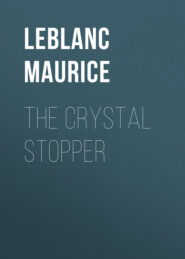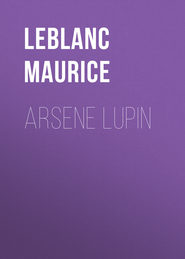По всем вопросам обращайтесь на: info@litportal.ru
(©) 2003-2025.
✖
The Extraordinary Adventures of Arsene Lupin, Gentleman-Burglar
Настройки чтения
Размер шрифта
Высота строк
Поля
“Did you not say that your friend Henriette had a son?”
“Yes; a son named Raoul.”
“Then, in all probability, it was Raoul who committed the theft.”
“What proof have you of that?”
“What proof! Plenty of it....For instance–”
He stopped, and reflected for a moment, then continued:
“For instance, that gangway or bridge. It is improbable that the child could have brought it in from outside the house and carried it away again without being observed. He must have used something close at hand. In the little room used by Henriette as a kitchen, were there not some shelves against the wall on which she placed her pans and dishes?”
“Two shelves, to the best of my memory.”
“Are you sure that those shelves are really fastened to the wooden brackets that support them? For, if they are not, we could be justified in presuming that the child removed them, fastened them together, and thus formed his bridge. Perhaps, also, since there was a stove, we might find the bent poker that he used to open the transom.”
Without saying a word, the count left the room; and, this time, those present did not feel the nervous anxiety they had experienced the first time. They were confident that Floriani was right, and no one was surprised when the count returned and declared:
“It was the child. Everything proves it.”
“You have seen the shelves and the poker?”
“Yes. The shelves have been unnailed, and the poker is there yet.”
But the countess exclaimed:
“You had better say it was his mother. Henriette is the guilty party. She must have compelled her son–”
“No,” declared the chevalier, “the mother had nothing to do with it.”
“Nonsense! they occupied the same room. The child could not have done it without the mother’s knowledge.”
“True, they lived in the same room, but all this happened in the adjoining room, during the night, while the mother was asleep.”
“And the necklace?” said the count. “It would have been found amongst the child’s things.”
“Pardon me! He had been out. That morning, on which you found him reading, he had just come from school, and perhaps the commissary of police, instead of wasting his time on the innocent mother, would have been better employed in searching the child’s desk amongst his school-books.”
“But how do you explain those two thousand francs that Henriette received each year? Are they not evidence of her complicity?”
“If she had been an accomplice, would she have thanked you for that money? And then, was she not closely watched? But the child, being free, could easily go to a neighboring city, negotiate with some dealer and sell him one diamond or two diamonds, as he might wish, upon condition that the money should be sent from Paris, and that proceeding could be repeated from year to year.”
An indescribable anxiety oppressed the Dreux-Soubise and their guests. There was something in the tone and attitude of Floriani—something more than the chevalier’s assurance which, from the beginning, had so annoyed the count. There was a touch of irony, that seemed rather hostile than sympathetic. But the count affected to laugh, as he said:
“All that is very ingenious and interesting, and I congratulate you upon your vivid imagination.”
“No, not at all,” replied Floriani, with the utmost gravity, “I imagine nothing. I simply describe the events as they must have occurred.”
“But what do you know about them?”
“What you yourself have told me. I picture to myself the life of the mother and child down there in the country; the illness of the mother, the schemes of and inventions of the child sell the precious stones in order to save his mother’s life, or, at least, soothe her dying moments. Her illness overcomes her. She dies. Years roll on. The child becomes a man; and then—and now I will give my imagination a free rein—let us suppose that the man feels a desire to return to the home of his childhood, that he does so, and that he meets there certain people who suspect and accuse his mother.... do you realize the sorrow and anguish of such an interview in the very house wherein the original drama was played?”
His words seemed to echo for a few seconds in the ensuing silence, and one could read upon the faces of the Count and Countess de Dreux a bewildered effort to comprehend his meaning and, at the same time, the fear and anguish of such a comprehension. The count spoke at last, and said:
“Who are you, monsieur?”
“I? The chevalier Floriani, whom you met at Palermo, and whom you have been gracious enough to invite to your house on several occasions.”
“Then what does this story mean?”
“Oh! nothing at all! It is simply a pastime, so far as I am concerned. I endeavor to depict the pleasure that Henriette’s son, if he still lives, would have in telling you that he was the guilty party, and that he did it because his mother was unhappy, as she was on the point of losing the place of a.... servant, by which she lived, and because the child suffered at sight of his mother’s sorrow.”
He spoke with suppressed emotion, rose partially and inclined toward the countess. There could be no doubt that the chevalier Floriani was Henriette’s son. His attitude and words proclaimed it. Besides, was it not his obvious intention and desire to be recognized as such?
The count hesitated. What action would he take against the audacious guest? Ring? Provoke a scandal? Unmask the man who had once robbed him? But that was a long time ago! And who would believe that absurd story about the guilty child? No; better far to accept the situation, and pretend not to comprehend the true meaning of it. So the count, turning to Floriani, exclaimed:
“Your story is very curious, very entertaining; I enjoyed it much. But what do you think has become of this young man, this model son? I hope he has not abandoned the career in which he made such a brilliant début.”
“Oh! certainly not.”
“After such a début! To steal the Queen’s Necklace at six years of age; the celebrated necklace that was coveted by Marie-Antoinette!”
“And to steal it,” remarked Floriani, falling in with the count’s mood, “without costing him the slightest trouble, without anyone thinking to examine the condition of the window, or to observe that the window-sill was too clean—that window-sill which he had wiped in order to efface the marks he had made in the thick dust. We must admit that it was sufficient to turn the head of a boy at that age. It was all so easy. He had simply to desire the thing, and reach out his hand to get it.”
“And he reached out his hand.”
“Both hands,” replied the chevalier, laughing.
His companions received a shock. What mystery surrounded the life of the so-called Floriani? How wonderful must have been the life of that adventurer, a thief at six years of age, and who, to-day, in search of excitement or, at most, to gratify a feeling of resentment, had come to brave his victim in her own house, audaciously, foolishly, and yet with all the grace and delicacy of a courteous guest!
He arose and approached the countess to bid her adieu. She recoiled, unconsciously. He smiled.
“Oh! Madame, you are afraid of me! Did I pursue my role of parlor-magician a step too far?”
She controlled herself, and replied, with her accustomed ease:
“Not at all, monsieur. The legend of that dutiful son interested me very much, and I am pleased to know that my necklace had such a brilliant destiny. But do you not think that the son of that woman, that Henriette, was the victim of hereditary influence in the choice of his vocation?”
He shuddered, feeling the point, and replied:
“I am sure of it; and, moreover, his natural tendency to crime must have been very strong or he would have been discouraged.”
“Why so?”
“Because, as you must know, the majority of the diamonds were false. The only genuine stones were the few purchased from the English jeweler, the others having been sold, one by one, to meet the cruel necessities of life.”
“It was still the Queen’s Necklace, monsieur,” replied the countess, haughtily, “and that is something that he, Henriette’s son, could not appreciate.”











